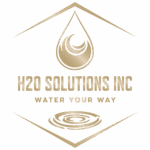When you turn on the tap in your kitchen or bathroom, you probably don’t think twice about where that water comes from. But understanding the journey your sink water takes before it reaches your faucet is essential, not just for curiosity’s sake, but for your health and peace of mind.
At H2O Solutions, we believe in empowering homeowners with knowledge about their water. As an authorized EcoWater filtration dealer, we’re here to help you understand what’s in your water and what you can do about it.
City Water
If you use city water, your sink water comes from one of two main sources: surface water or groundwater.
Surface Water
Surface water comes from lakes, rivers, and reservoirs. It’s collected and treated by municipal water treatment plants before being piped to homes. Because surface water is exposed to the environment, it’s more likely to contain runoff from agriculture, industrial waste, and other pollutants.
Groundwater
Groundwater is drawn from underground aquifers via wells. It’s naturally filtered through layers of soil and rock, but it can still carry contaminants like iron, manganese, nitrates, or even arsenic, depending on local geology.
If you live in Spokane and use city water, your water comes from the Spokane Valley-Rathdrum Prairie Aquifer.
What Happens at the Treatment Plant?
Municipal water treatment plants use several steps to make water safe to drink:
- Coagulation and Flocculation – Chemicals are added to bind with particles and form larger clumps.
- Sedimentation – These clumps settle out of the water.
- Filtration – Water is passed through sand, gravel, and charcoal filters.
- Disinfection – Chlorine, chloramine, or ozone is used to kill bacteria and viruses.
Despite this process, treated water can still contain:
- Hard minerals like calcium and magnesium
- Disinfectant by-products
- Trace pharmaceuticals
- Lead from old pipes
- Microplastics
- PFAS/PFOAS
- + Other harmful water contaminants
What About Well Water?
If you’re on a private well, your water doesn’t go through a treatment plant. That means the responsibility for testing and treating the water is entirely on you. Well water can be high in minerals, bacteria, and other naturally occurring or man-made contaminants.
If you don’t have a water bill, you probably have well water.
Why Filtration Still Matters
Even treated municipal water can contain substances you don’t want in your home—especially in your drinking water, cooking water, or the water you use to wash fresh produce.
That’s where water filtration systems come in. Whether you’re on city water or well water, a home filtration system can:
- Remove chlorine taste and odor
- Reduce lead, sediment, and other impurities
- Soften hard water to protect appliances and plumbing
- Improve the overall quality of your water for a healthier lifestyle
Know Your Water. Trust Your Water.
At H2O Solutions, we provide free water testing so you can know exactly what’s in your water. When you understand where your water comes from and what’s in it, you can make confident choices about how to protect your home and your family.
Published on: 8/21/2025
Last updated on: 8/21/2025



